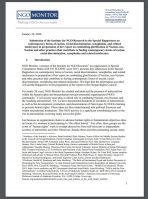NGO Monitor Submission on Nazism to Special Rapporteur on Racism
Full Article
Click Here for Full Submission
[Excerpts]
Introduction
NGO Monitor, a project of the Institute for NGO Research,1 an organization in Special Consultative Status with UN ECOSOC since 2013, presents this submission to the Special Rapporteur on contemporary forms of racism, racial discrimination, xenophobia, and related intolerance in preparation of her report on combatting glorification of Nazism, neo-Nazism and other practices that contribute to fueling contemporary forms of racism, racial discrimination, xenophobia and related intolerance. We hope that the information provided will aid the Rapporteur in the preparation of her report to the Human Rights Council.
For nearly 20 years, NGO Monitor has studied and analyzed the presence of antisemitism within the human rights and humanitarian non-governmental organizations (NGO) community.2 Civil society must play a critical role in combating Nazism, neo-Nazism, and the resulting antisemitism. Yet, we have documented hundreds of incidents of antisemitism, as well as the development, promotion, and dissemination of Nazi tropes by NGOs claiming to promote human rights. These ideas are then mainstreamed into political discourse and within international institutions. This NGO activity is a significant contributing factor to the rise in antisemitism occurring today across the globe.
Just because an organization claims to advance human rights or humanitarian objectives does not mean it is immune to participating in “the oldest hatred.” Too often, these groups use the cover of “human rights” work to exempt themselves from self-criticism or independent scrutiny of antisemitic activities. Moreover, despite these activities promoting racism, many governments and international institutions including the European Union and the UN
continue to provide mass amounts of funding to these hateful groups.
It is critical, therefore, that the Special Rapporteur address in her report antisemitism in the form of Nazism emanating from the NGO sector.
Per the Special Rapporteur’s Call, NGO Monitor’s submission provides “descriptions, examples, scholarship, and other accounts describing contemporary manifestations of antisemitism” taking place with the human rights and humanitarian NGO community. We conclude with recommendations.
International Holocaust Remembrance Alliance Definition of Antisemitism
One of the best ways the international community, including UN agencies, can prevent Nazism and neo-Nazism is to provide tools by which it can be identified. Once such tool is the widely accepted International Holocaust Remembrance Alliance’s (IHRA) working definition of antisemitism and the working definition of Holocaust denial and distortion.3 They represent the growing consensus definitions of both classical and contemporary forms of antisemitism. As of January 2020, this working definition, launched in 2000 at the Stockholm International Forum on the Holocaust4 has been adopted by the European Union’s Agency for Fundamental Rights (FRA), the OSCE Office for Democratic Institutions and Human Rights (OSCE/ODIHR), and more than . The IHRA working definition has been adopted by nearly 30 countries and counting around the world, including Canada, Italy, the UK, Austria, Bulgaria, Germany, Lithuania, Romania, Macedonia, Uruguay, and the United States. On June 4, 2019, Secretary General of the Organization for American States Luis Almagro voiced his support for the IHRA definition and its adoption by the OAS.5
The IHRA working definitions clearly articulate what is and what is not antisemitism, as well as how to distinguish between legitimate criticism of Israel and antisemitism. We urge the Special Rapporteur to use the IHRA definitions as the fundamental benchmark in her report.
We also urge all the Special Rapporteur to recommend that all UN frameworks adopt and implement these working definitions. Unfortunately, far too many UN agencies and officials frequently violate their principles.
Footnotes
- Members of the Institute’s Advisory Board include Elliott Abrams, Senior Fellow for Middle Eastern Studies at the Council on Foreign Relations; former Canadian Ambassador to Israel, Amb. Vivian Bercovici; Hon. Michael Danby, former MP Australian Labor Party; Harvard Professor Prof. Alan Dershowitz; Canadian Senator, Hon. Linda Frum; Colonel Richard Kemp, former commander of British forces in Iraq and Afghanistan; Douglas Murray, Director of the Centre for Social Cohesion; former Member of Italian Parliament, Hon. Fiamma Nirenstein, UCLA Professor and President of the Daniel Pearl Foundation, Prof. Judea Pearl; US Jurist and former Legal Advisor to the State Department Judge Abraham Sofaer; Dr. Einat Wilf, former member of Knesset and advisor to Shimon Peres; Harvard Professor Prof. Ruth Wisse; R. James Woolsey, former US Director of Central Intelligence; and Israeli Supreme Court Justice, Justice Elyakim Rubinstein
- Professor Gerald M. Steinberg and Anne Herzberg, “The Role of International Legal and Justice Discourse in Promoting the New Antisemitism,” in Anti-Zionsim and Antisemitism (Alvin Rosenfeld, ed. Indiana University Press 2019); Prof. Gerald M. Steinberg, “Europeans Fund Anti-Israel Libels,” Middle East Quarterly, Winter 2015: https://www.meforum.org/4912/europeans-fund-anti-israel-libels; Anne Herzberg, “NGOs and the New Antisemitism,” in Global Antisemitism: A Crisis of Modernity (Charles Small, ed., Brill 2013); Prof. Gerald M. Steinberg, “Boycotts, Bias and Politics in the Arab-Israeli Conflict,” American Association of University Professors Journal of Academic Freedom, Vol. 4 (2013): https://www.ngomonitor.org/academicpublications/boycotts_bias_and_politics_in_the_arab_israeli_conflict/
- https://www.holocaustremembrance.com/working-definitions-and-charters
- IHRA, “Stockholm Declaration,” https://www.holocaustremembrance.com/stockholm-declaration
- https://jewishjournal.com/news/nation/299597/organization-of-american-states-leader-announces-supportihradefinition-of-anti-semitism

